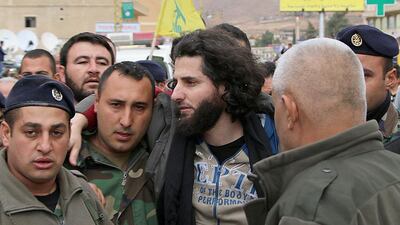BEIRUT// Al Qaeda’s Syrian affiliate Jabhat Al Nusra released 16 members of Lebanon’s security services on Tuesday after holding them hostage for more than a year.
The release was part of a swap that saw Lebanon free 13 prisoners, including the former wife of ISIL leader Abu Bakr Al Baghdadi, Saja Al Dulaimi
However, a security source said 10 of the prisoners had chosen not to be transferred to Al Nusra and would be returned to Beirut.
The 16 people released were among approximately 30 hostages taken by ISIL and Al Nusra when they battled with Lebanese security forces after briefly capturing the town of Arsal on the Lebanon-Syria border in August 2014. ISIL and Al Nusra each executed two prisoners over the last year.
On Tuesday, Al Nusra also turned over the body of one of the executed hostages.
ISIL is still holding nine soldiers, but has not been seen as willing to negotiate.
“Today is a day of joy, but we look forward to a day of joy when we bring back the servicemen kidnapped by Daesh,” said the head of Lebanon’s general security body, Maj Gen Abbas Ibrahim, who oversaw the release efforts.
He said “no efforts will be spared to secure the return of those held by Daesh”, adding that Lebanon was prepared to negotiate with ISIL “if we can find somebody to negotiate with”.
Video footage showed the prisoners boarding four Red Cross vehicles before being driven to an army checkpoint.
Armed Al Nusra fighters – their faces concealed – could be seen celebrating the exchange as they waved their group’s black banner.
Lebanon’s prime minister Tammam Salam thanked Qatar, which brokered the deal, in a speech celebrating the release of the hostages – 13 policemen and three soldiers.
For the past 16 months, relatives of the hostages have occupied tents set up in Beirut’s glitzy downtown district, near the prime minister’s headquarters, to protest what they deemed as the government’s inactivity.
More: Sectarian politics prove mighty obstacle for Beirut protesters
On Tuesday afternoon, the released hostages were brought to downtown Beirut to reunite with their loved ones.
Amid the celebrations, the mother of one of the ISIL hostages came to congratulate the families of those being freed, but quickly dissolved into tears.
“Don’t forget about us,” she pleaded with them, as they assured her they would continue to pressure the Lebanese government to secure the release of the remaining hostages.
Among the prisoners who decided not to go with Al Nusra was Ms Dulaimi, who told a television crew that she hoped to travel to Beirut and then Turkey.
Ms Dulaimi was captured by Lebanese security forces one year ago as she tried to cross into Lebanon from Syria with fake documents.
On Tuesday, she implied she was estranged from ISIL leader Al Baghdadi, saying they had been divorced for “six or seven years”.
The hostage ordeal and the brief fall of the town of Arsal last year have been stark reminders of the chronic weakness of Lebanon’s government, which has been without a president for 18 months and recently unable to dispose of the country’s waste, let alone expel militants from its border areas.
The negotiated hostage release is “a dose of optimism to the country while its struggling with overwhelming challenges”, said Imad Salamey, a professor of political science at Beirut’s Lebanese American University.
It was significant for Lebanon where divisions are rife, said Mr Salamey, adding that the government negotiated for the servicemen who were from different sectarian backgrounds, showing that they did so on behalf of a nation rather than a particular sect.
While ISIL and Al Nusra had offensive capabilities along Lebanon’s border in 2014, the two groups have seen their supply lines cut and have been weakened by more than a year of artillery strikes by the Lebanese government and several strong Hizbollah offensives. Yet despite being isolated, weak and confined to a small pocket of territory, both groups have managed to hold ground on the porous border area and could not be forced by Lebanon to surrender their hostages.
In addition to taking the hostages, Al Nusra and ISIL have also claimed a number of deadly bombings across Lebanon.
The town of Arsal is now claimed as government-controlled territory, but it remains a place where militants still operate and is not considered safe. In fact, the video footage of Tuesday’s prisoner swap reaffirmed Al Nusra’s continued presence right outside the town.
Pushing out the militants from Lebanon will remain a challenge for the government.
“Hizbollah is involved militarily in Syria, and that gives all kinds of Lebanese and Syrian extremists or militant Sunni groups pretext to operate and retaliate inside Lebanon,” said Mr Salamey. “This makes it hard for the state to emerge or to play hard ball with this issue because it fears appearing to support one sect against the others.”
foreign.desk@thenational.ae
* with additional reporting from agencies

